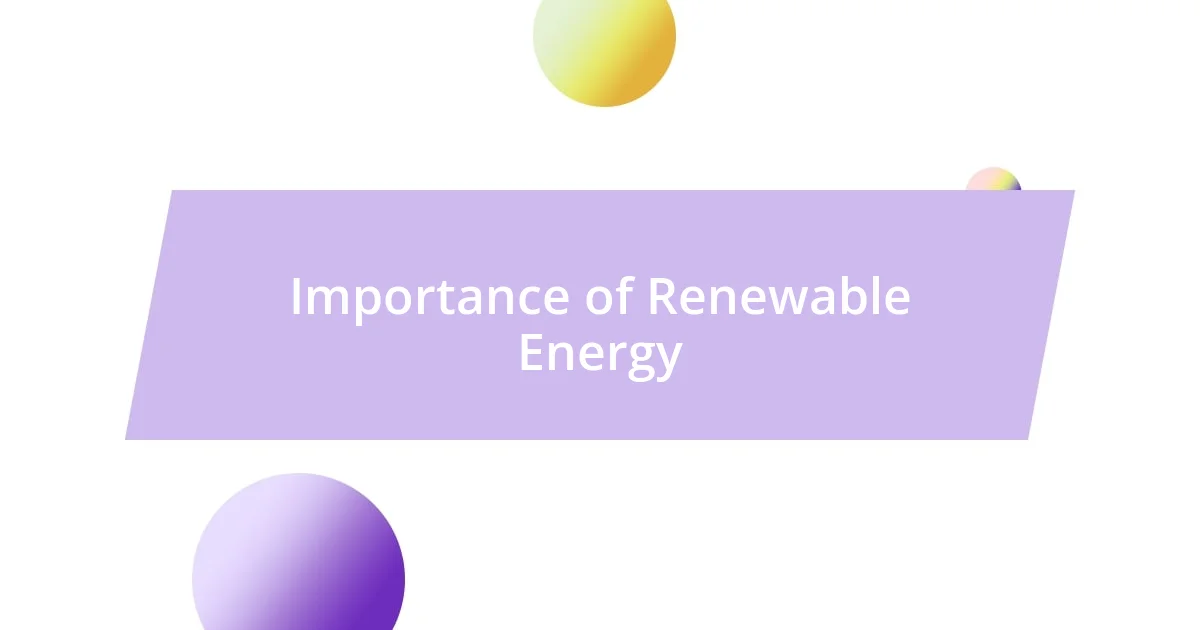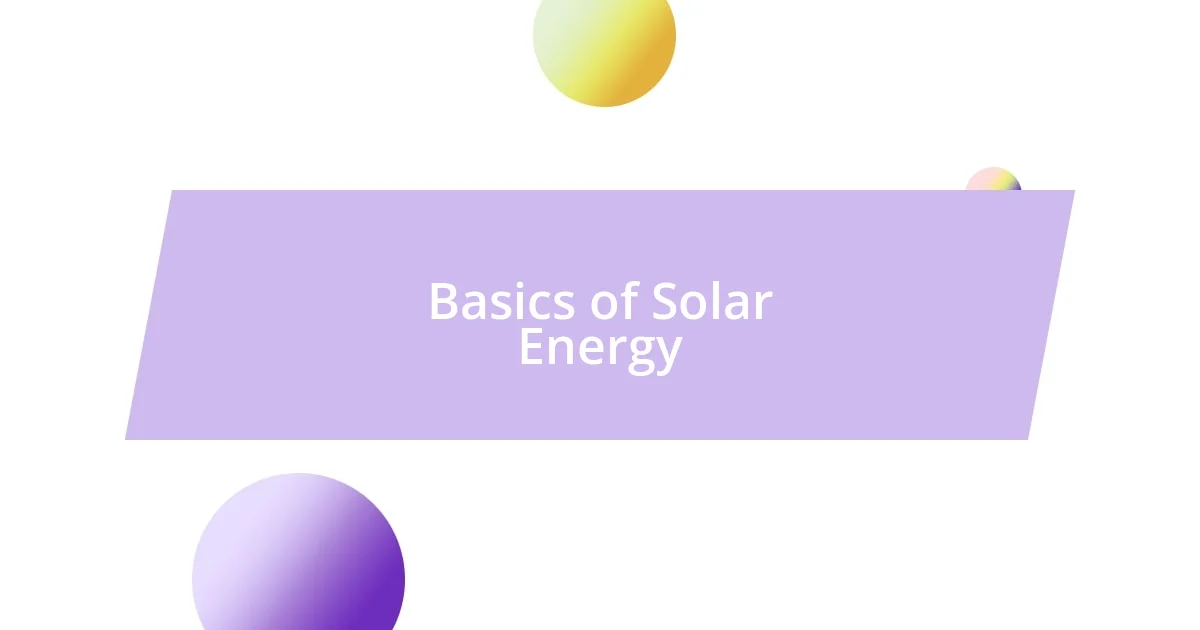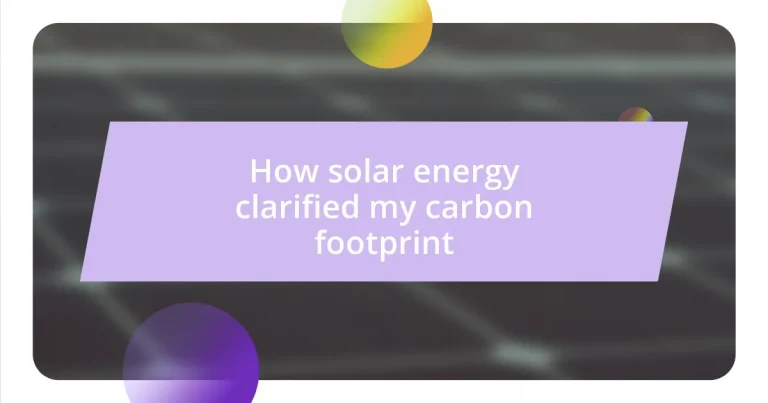Key takeaways:
- Measuring personal carbon footprints reveals the significant impact of daily choices, such as transportation and diet, on overall emissions.
- Transitioning to renewable energy, particularly solar power, empowers individuals and contributes to environmental sustainability by reducing carbon emissions and promoting energy independence.
- Calculating solar impact not only highlights carbon savings but also financial benefits, reinforcing the importance of personal choices in fostering a greener future.

Understanding Carbon Footprint
A carbon footprint essentially measures how much carbon dioxide and greenhouse gases are produced directly or indirectly by our activities. When I first stumbled upon the idea of measuring my own carbon footprint, I felt a mix of curiosity and anxiety — how could my daily choices impact the planet? Tracking everything from my energy consumption to my travel habits opened my eyes to the broader environmental implications of seemingly minor decisions.
Have you ever thought about the cumulative effects of every purchase you make? For instance, when I started calculating my footprint, I was surprised to see how much my car usage contributed to my overall emissions. It was a stark realization that every time I opted for convenience, I was indirectly adding to the problem. I often wondered if others feel the same weight of responsibility; it’s not just about statistics — there’s emotion tied to understanding our impact on the world around us.
Moreover, it became clear to me that my choices extend beyond just my household. While researching, I discovered that food consumption plays a significant role in one’s carbon footprint. I remember changing my diet to include more local and organic produce, and it felt empowering to know that my choices could, in a small way, contribute to healthier planet practices. Every little step counts, doesn’t it? Understanding my carbon footprint has transformed my perspective on how interconnected we all are in this fight against climate change.

Importance of Renewable Energy
The importance of renewable energy goes beyond just mitigating climate change; it’s about creating a healthier and more sustainable future for ourselves and future generations. I felt a spark of hope when I learned that renewable sources like solar and wind can significantly reduce pollution compared to fossil fuels. The idea that clean energy could be harnessed from nature made me excited about the potential for change.
- Environmental Health: Reduces air and water pollution, contributing to better public health.
- Energy Security: Decreases dependence on imported fuels, enhancing national energy independence.
- Economic Growth: Creates jobs in emerging industries, stimulating local economies.
- Sustainability: Provides an endless source of energy, unlike finite fossil fuels.
On a personal note, transitioning to solar energy was transformative not only for my carbon footprint but also for my sense of agency. I remember the joy I felt when my solar panels first started generating electricity, translating into both savings on bills and pride in contributing to a greener planet. It was empowering to know that my choices could lead to positive change, reinforcing the idea that every effort counts in the battle against environmental degradation.

Basics of Solar Energy
To understand solar energy, it’s important to grasp its fundamental principle: capturing sunlight and converting it into usable energy. I remember the first time I stood under the sun, watching how solar panels were quietly harnessing energy that naturally surrounded us. It felt almost magical to realize that this abundant resource was just waiting to be tapped into — like finding a treasure hidden in plain sight.
Solar energy systems typically use photovoltaic cells, which convert sunlight directly into electricity. This technology fascinated me because it allowed me to generate my own power, and for the first time, I felt a sense of independence from traditional energy sources. Plus, understanding how these cells work made me appreciate the innovation behind clean energy.
When comparing solar energy to fossil fuels, the benefits become abundantly clear. Solar is renewable, sustainable, and does not emit carbon dioxide during operation. This realization became a turning point in my carbon footprint journey, as knowing I could rely on a clean source of energy not only lessened my impact on the environment but also provided a sense of reassurance and hope for a cleaner, greener future.
| Aspect | Solar Energy | Fossil Fuels |
|---|---|---|
| Renewability | Renewable | Non-renewable |
| CO2 Emissions | Zero during operation | High during extraction and use |
| Long-term Costs | Lower over time | Higher due to depletion |
| Energy Independence | Promotes self-sufficiency | Depends on imports |
| Environmental Impact | Minimal | Significant |

Calculating Your Solar Impact
Calculating your solar impact can feel overwhelming at first, but it’s a rewarding journey. I still remember the day I calculated the carbon savings from my solar panels—it was like unlocking a secret world of numbers that all pointed to a greener me. By estimating the energy my panels produce and comparing it to the average emissions from traditional electricity sources, I discovered that I was significantly reducing my carbon footprint. It made me stop and think: how many people can say they’ve truly measured their impact this way?
One method I used involved simple online calculators, where I input details like my energy usage and the size of my solar system. It felt almost like a game, seeing the drastic difference in emissions represented in tons of CO2. Each time I entered figures, I felt a surge of pride, imagining how many trees I was effectively saving with every kilowatt-hour generated. What if everyone had the chance to realize their own positive impact on the planet?
Furthermore, there’s something profound about tracking not just carbon savings but also the financial benefits. As I began to see my utility bills drop, it reinforced my commitment to solar energy. In a way, each saved dollar felt like another piece of evidence that my choice was not just sustainable, but also smart. It raises a curious thought: when we calculate our solar impact, are we also measuring our power of choice in creating a better world?

Benefits of Reducing Carbon Emissions
Reducing carbon emissions comes with numerous benefits that can enhance both our environment and well-being. I remember the first time I noticed clearer skies after committing to solar energy; it made me realize how much cleaner air impacts our health. Fewer emissions mean less respiratory illness and a better quality of life. Isn’t it inspiring to think about how our decisions can lead to tangible improvements in the air we breathe?
Another significant benefit is the connection to climate change mitigation. I often think of the future generations, wondering what Earth will look like for them. By decreasing our carbon emissions today, we help protect ecosystems and conserve resources for tomorrow. It feels empowering to know that my small actions contribute to a larger movement toward sustainability and preservation of nature.
Additionally, reducing emissions can promote energy independence. When I switched to solar, I felt a newfound control over my energy consumption. It’s incredible to think that by harnessing sunlight, I no longer depended fully on external power sources that often rely on fossil fuels. Have you considered how energy self-sufficiency could change your life? Transitioning to clean energy not only protects the planet but also empowers individuals to take charge of their own energy needs.














